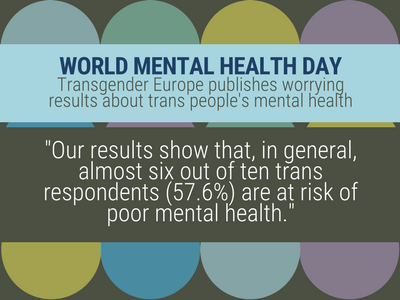World Mental Health Day: Transgender Europe Publishes Worrying Results About Trans People’s Mental Health

On World Mental Health Day (October 10) Transgender Europe publishes worrying research results about trans people’s mental health. The results form part of the research report “Overdiagnosed but Underserved”, which presents opinions from both health care users as well as health care providers on both general, as well as, trans-specific healthcare services in Georgia, Poland, Serbia, Spain, and Sweden.
“Our results show that, in general, almost six out of ten trans respondents (57.6%) are at risk of poor mental health. When we compare the trans respondents in the European Quality of Life Survey (EQLS), we see that trans people, in all countries under study, have a higher risk of poor mental health than their cis comparators.” says Richard Köhler, TGEU Senior Policy Officer.
Trans people are exposed to a lot of mandatory mental health screenings, for example when accessing transition-related care or as a mandatory part of legal gender recognition. This contributes to ill-health, and alarmingly, every second trans person surveyed reported delaying seeking general healthcare. Fear of bias, prejudice, or lack of confidence in health services offered are major factors for this reluctance.
We need gender-affirming healthcare services in order to address these issues and more, including;
- a reduction in waiting times;
- an increase in staff, and for those staff to be significantly better trained;
- far more choice;
- self-determination for healthcare recipients.
TGEU also demands that trans identities are taken out of mental health catalogues. This is the foundation for reformed healthcare that focuses on individual health needs.
About the Report;
Responses from 885 Trans healthcare users and 888 Healthcare providers have been gathered in two separate surveys. The countries surveyed (Georgia, Poland, Serbia, Spain, and Sweden) were chosen due to their geographical and cultural disparities within Europe, and provide a rich set of data. The research was conceptualised and implemented in 2016-2017 by TGEU with partner organisations in five countries;
Both surveys generated lots of data. This reports consists of 4 parts:
- The experiences of trans people in both general as well as trans-specific healthcare services in Georgia, Poland, Serbia, Spain, and Sweden;
- opinions on health care from both health care users as well as health care providers;
- suggestions on how to improve access to general and trans-specific healthcare;
- specific country reports on all the five countries under study;
The reader will find the overall conclusions by TGEU and its partners in this research project in the final chapter.